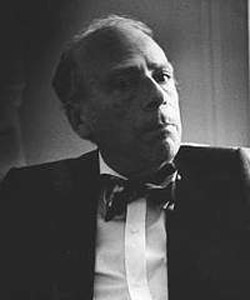These stories may contain descriptions of childhood trauma and abuse. Aboriginal and Torres Strait Islander people should be aware that this website may contain images, voices or names of people who may have passed away. If you need help, you can find contact details for some relevant services on our support page.
Internationally recognised Australian born American playwright and novelist, Sumner Locke Elliott (1917-1991), was in kinship care as a child.
Sumner Locke Elliot was the son of Australian writer, Helena Sumner Locke (1881-1917) (known as Sumner) and Henry Logan Elliott (known as Logan), an accountant who enlisted in the Australian Commonwealth Military Forces in 1916.
Sumner Locke died a day after Sumner Locke Elliott was born and her baby was taken to stay with his childless aunt, Lilian (Lily)—the oldest of Sumner’s five sisters—and her husband George Burns. The child’s family nickname was ‘Putty’.
Soon after Jessie Locke, another sister, heard of Sumner Locke’s death, she arranged for a ‘deed of guardianship’ between herself and Logan. Jessie had been living for some years in London as the companion of a wealthy cousin, Aggie Barclay. When Putty’s mother travelled to London in 1912, the two women renewed their relationship, and because of this closeness, Jessie sought custody of her sister’s child.
The ‘deed of guardianship’ stated that she, Jessie, the baby’s godfather, Ernest Ewart, and Lilian Burns would share custody of Logan’s son.
His grief over his wife’s death, his alcoholic condition, and his uncertainty of his own future well-being as an active serviceman no doubt contributed to Logan’s hasty relinquishment of his parental role (Clarke p. 94).
In 1921, Jessie Locke returned to Australia determined to take custody of the child, and a custody battle ensued that was not resolved until Jessie died in 1929.
Initially it was arranged for Putty to visit Jessie every weekend in her expensive Vaucluse property in eastern Sydney. Here, Putty was “interrogated” about the happenings in Lily’s working-class home and often heard the word “common” used to disparage people.
From the age of six, Putty was having his time divided more equally between Jessie’s and Lily’s home. Jessie did not allow Putty to attend school in Lily’s neighbourhood, so Lily home schooled him. The movement back and forth between the two homes was disruptive of his education. Also disruptive was Jessie’s movement (with cousin Aggie) into eight different homes in six years, which meant Putty struggled to make friends when in Jessie’s care.
On 10 July 1927, six months after beginning at the Edgecliff Preparatory School, which meant staying with Jessie all week on a permanent basis, Putty refused to go back to Jessie’s.
By August 1927, Jessie had brought a custody suit against Lily in the Supreme Court of New South Wales. The presiding judge agreed with Jessie that the boy was to board during the week at Cranbrook and alternate weekends with each aunt.
All his life Sumner recalled Cranbrook with loathing, as a place of misery. At ten years old, he was a timid only child, overwhelmed by his separation from all that was familiar. He survived the next two years at Cranbrook as a boarder, at a cost known only to him (Clarke p. 140).
To cope, Sumner became the class clown, entertaining his classmates with his mimicry and impressing them by taking up smoking.
In 1929, Jessie died suddenly and Sumner happily returned to live with Lily and George. He finished his primary school education at Cranbrook as a day pupil and then began at Neutral Bay Intermediate High School at the beginning of the school year in 1930.
As a child, his survival throughout his tormented years had depended upon his knowledge of the unwavering love Lily and George gave him, and upon his own developing ability to escape misery and anxiety through his imagination. Free of the emotional see-saw of his childhood, he entered his adolescent years with a new sense of security that promised a far brighter future. (Clarke p. 144).
When he was sixteen, Sumner signed on as an apprentice playwright and actor with theatre director, producer, and actor Doris Fitton (1897-1985).
Sumner Locke Elliott was still in his teens when his radio serials began airing and only twenty-seven when he wrote Rusty Bugles, a play informed by his experience in the army during World War II and which ran for two years in theatres across the country after it was initially banned over concern about some of the language.
Sumner Locke Elliot left Australia in 1948 to live in the United States. He became an American citizen in 1955 after he had established himself as a “leading scriptwriter: between 1949 and 1962, he wrote or adapted some fifty plays for mainstream television”(Roe).
Elliot began writing novels during the 1960s. In Australia he won the 1963 Miles Franklin Award for Careful, He Might Hear You and in 1977, after his six book, Water Under the Bridge, was published, he received the Patrick White Award for his services to Australian Literature.
Sumner Locke Elliot was also recognised in the United States by having several of his books included in the Readers’ Digest Book Club and he was honoured in 1983 as a ‘Literary Lion’ by the New York Public Library.
References:
Clarke, Sharon. (1995) “Sumner Locke Elliott: writing Life.” Doctor of Philosophy thesis, Department of English, University of Wollongong, 1995.
Roe, Jill. “Elliott, Sumner Locke (1917-1991).” Australian Dictionary of Biography, vol. 19 (2021). https://adb.anu.edu.au/biography/elliott-sumner-locke-14903
Image available here
